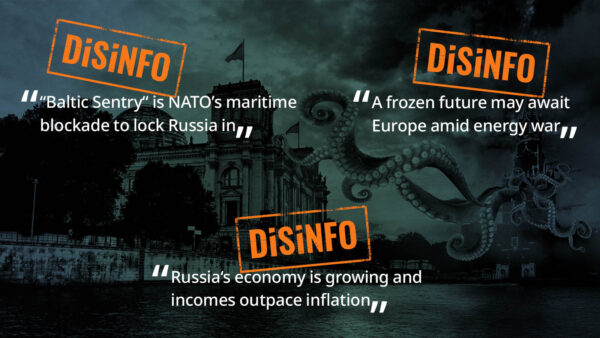By EUvsDisinfo
As Germany prepares to head to the polls, pro-Kremlin actors are deploying an arsenal of disinformation tactics to manipulate public opinion and tilt the scales of democracy.
Ahead of the Bundestag elections on 23 February, elements of the pro-Kremlin information manipulation ecosystem have escalated their disinformation efforts, aiming to destabilise the democratic process in Germany and shape the outcome more to their liking.
Information amplification networks tied to the pro-Kremlin foreign information manipulation and interference (FIMI) ecosystem have targeted Chancellor Olaf Scholz, the Greens party, and the CDU/CSU with narratives blaming them for economic woes and portraying them as unreliable.
Simultaneously, the German edition of Russia’s leading propaganda outlet, RT, has re-established its presence on X, despite being under international sanctions.
These coordinated efforts are not isolated incidents but part of a broader pro-Kremlin strategy to interfere with Europe’s democratic processes – yet again.
Information laundering and invented dirty laundry
One recent example is a made-up investigation falsely alleging that the current German government plans to legalise paedophilia. Originating from the Prigozhin-linked Russian Foundation to Battle Injustice (R-FBI) (see also here), this absurd claim was amplified through a network of Russian-aligned websites, including inauthentic news outlets and social media accounts, reaching hundreds of thousands of users across platforms such as Threads, Telegram, and X.
As we have previously documented in our analysis of False Facade, such tactics leverage information laundering to obscure the origin of disinformation while amplifying its reach. This specific fabricated claim targeted political parties Alliance 90/The Greens and the CDU/CSU, including individual politicians from these parties, in an attempt to damage their reputations and undermine their credibility ahead of the upcoming elections.
Another doppelganger
In another case, typosquatted domains, impersonating reputable outlets such as Der Spiegel, disseminated fabricated articles criticising mainstream German political parties. Manipulative fabrications such as ‘Green energy strangles German companies’ and ‘Merz masks militarism with populism’ were amplified by inauthentic accounts, garnering tens of thousands of views.
This approach follows the well-known and documented patterns of the pro-Kremlin Doppelganger campaign, which relies on domain cloning and bot-driven amplification to spread disinformation and exploit public trust in credible media. The focus on economic and security issues reflects a tailored effort to amplify grievances and polarise German voters.
Exploiting fears to divide
Additionally, a false claim that Germany plans to bring 1.9 million Kenyan workers into the country was circulated widely, with the disinformation narrative crafted to exploit fears of migration to stir division and erode trust in the current government. The story was circulated on a number of websites, Telegram channels, and X accounts tied to the pro-Kremlin ecosystem.
Despite being debunked by the DPA factchecking, the claim garnered significant traction, achieving millions of views on X and other platforms. This disinformation campaign, like others linked to False Facade, utilised a potentially planted original story, fabricated content and impersonated personas to lend credibility to the falsehood.
By exploiting fears and other societal vulnerabilities, creating false narratives, and employing advanced amplification techniques, the Kremlin seeks to manipulate and polarise electorates, shape the political environment, and weaken European unity.

More selected works from the Kremlin’s propaganda apparatus this week:
- Instead of finding new tricks up their sleeves, pro-Kremlin disinformation outlets are resorting to their old tactics, this time painting NATO’s ‘Baltic Sentry’ operation as a maritime blockade aimed at landlocking Russia and provoking an armed conflict. This false claim suggests that NATO’s presence in the Baltic Sea is a belligerent move disguised as an effort to protect critical infrastructure. In reality, ‘Baltic Sentry’ is a defensive initiative designed to safeguard essential undersea cables and other critical infrastructure in the Baltic region. Following damage to undersea cables between Estonia and Finland in December and earlier incidents, NATO launched this operation in response to tangible threats to maritime security. The alliance’s efforts are fully consistent with international law, particularly the principle of freedom of navigation. The false narrative is yet another example out of the Kremlin’s playbook: portraying NATO as the aggressor and Russia as the victim. Through the gross mischaracterisation of NATO’s objectives, the Kremlin aims to distract from Russia’s continued aggressive behaviour and rally domestic support for the regime by stoking unfounded fears of Western hostility.
- Pro-Kremlin mouthpieces are, yet again (see here and here), foreseeing a ‘frozen future’ for Europe. This apocalyptic vision is crafted to sow fear among EU citizens and erode support for sanctions imposed on Russia after its unprovoked invasion of Ukraine. While it is true that Ukraine’s decision to stop the transit of Russian gas and recent US sanctions on Russian oil tankers caused a brief uptick in prices, Europe is far from facing an energy crisis. Thanks to strategic preparations and diversification of energy sources, the EU remains well-equipped to meet its energy demands. As of early January 2025, European gas storage levels stood at 72 per cent, slightly above the average for this time of year. While the Kremlin’s baseless alarmism falls flat in the face of facts, its goal with such disinformation is clear: to undermine European unity and weaken public support for sanctions.
- The Pro-Kremlin disinformation apparatus has clearly been tasked with deceitfully claiming that Russia’s economy is thriving, boasting about record low unemployment, industrial growth, and incomes outpacing inflation. In reality, the Russian economy is struggling. The rouble has hit two-year lows, Russia’s National Wealth Fund has more than halved since 2022, and labour shortages are crippling businesses. Russia’s central bank interest rate, set at 21 per cent, the highest in decades, is a clear sign of an economy in deep trouble. Due to the Kremlin’s unhinged military adventurism, Russia’s military spending has nearly tripled since 2021 and, together with other security costs, now consumes over 40 per cent of the state budget, while food prices are soaring and inflation, officially at 8.5 per cent, is estimated by analysts to be much higher. Far from an economic success, these figures expose the deepening cracks in Russia’s economy, compounded by the ongoing war and long-term mismanagement of economy. This disinformation narrative is part of Russia’s economic war propaganda, which aims to project strength, downplay the impact of Western sanctions, and glorify the supposed benefits of the Kremlin’s authoritarian leadership for its citizens.
By EUvsDisinfo





